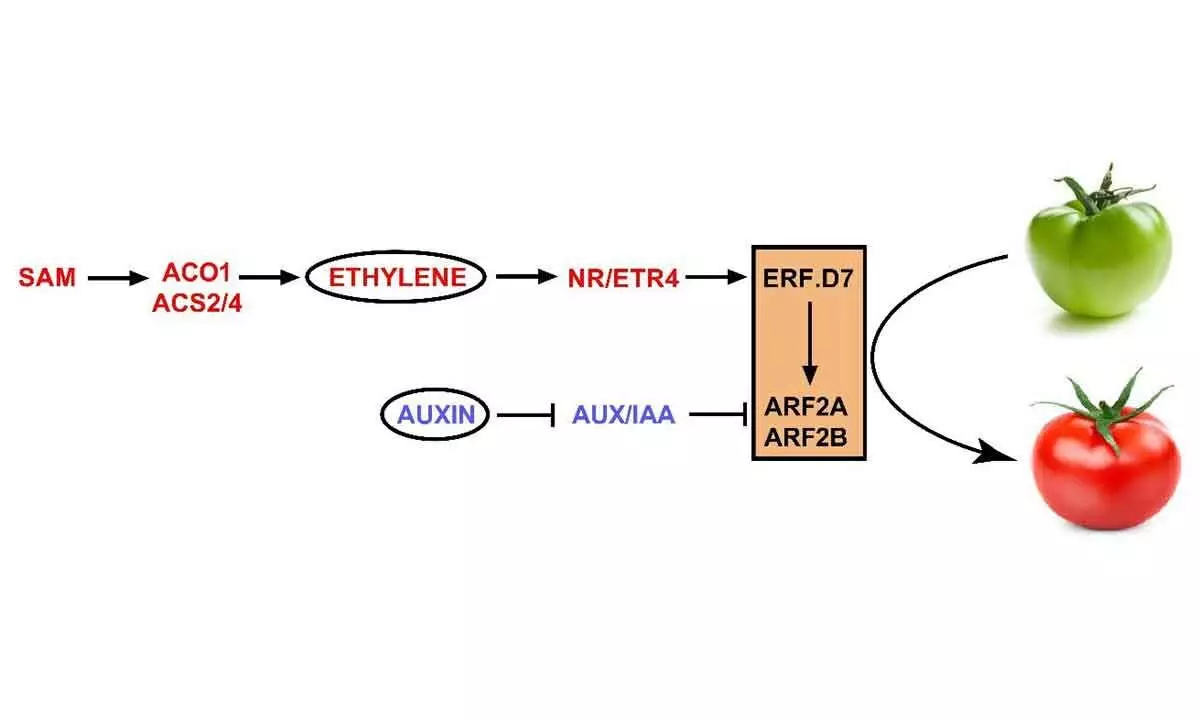UoH-DU team uncovers regulatory mechanism underlying ethylene-induced fruit ripening

The obligatory role of ethylene in inducing ripening in fleshy fruits is well known. Due to the essential nature of ethylene in ripening, its biosynthesis and signalling pathways are well studied in fleshy fruits such as tomato.
Hyderabad: The obligatory role of ethylene in inducing ripening in fleshy fruits is well known. Due to the essential nature of ethylene in ripening, its biosynthesis and signalling pathways are well studied in fleshy fruits such as tomato.
Several ripening-induced ethylene response factor (ERF) genes, the most downstream regulators of the ethylene signalling pathway, have been identified as the key regulators of fruit ripening program in fleshy fruits. However, a complete understanding of the genetic regulatory mechanisms underlying the ethylene-induced ripening programme remains to be fully understood. Improved knowledge of such molecular regulatory events is crucial to develop effective biotechnological strategies for improving ripening traits such as fruit flavor, pigment accumulation, and fruit shelf-life.
Varieties with prolonged fruit shelf-life can minimize the post-harvest loss of fruits and vegetables during transport and storage. Such superior varieties will also benefit farmers for their ROI and consumers for fresh and quality agri-products.
In a breakthrough collaborative research, a team of plant scientists jointly led by Dr Rahul Kumar, University of Hyderabad, and Prof. Arun K. Sharma, University of Delhi, has characterized a yet-to-be-described ripening-induced ERF gene, SlERF.D7, for its roles in the regulation of fruit ripening traits in tomato. The team developed both overexpression and gene-silenced lines of SlERF.D7. The transgenic lines with SlERF.D7 overexpression produced more intense red fruits and accumulated higher lycopene levels than wild-type controls.
In contrast, SlERF.D7 RNAi silenced fruits showed less pigment accumulation but enhanced firmness than their same-age wild-type controls. In the next step, the team investigated the regulatory mechanism underlying SlERF.D7 action and found that both overexpression and silenced lines fruits exhibit contrasting levels of ethylene and auxin, suggesting a perturbation in the signaling pathways of these hormones in the transgenic fruits.
Further experiments revealed that SlERF.D7 physically binds to and activates the promoters of another set of transcription factors i.e., auxin response factor 2 paralogs, to control tomato fruit ripening. Overall, the study generated new knowledge on the molecular regulation of tomato fruit ripening and can help develop breeding strategies to improve ripening traits in fleshy fruits.
Due to the novelty and significance of the research findings, this work entitled " Ethylene response factor ERF.D7 activates Auxin response factor 2 paralogs to regulate tomato fruit ripening" by Priya Gambhir et al. September 2022 (DOI: 10.1093/plphys/kiac441) is recently published in Plant Physiology, a highly reputed scientific journal published by the American Society of Plant Biologists, USA.
The team members are: Priya Gambhir, Ph.D. scholar, Department of Plant Molecular Biology, UDSC, DU; Vijendra Singh, Department of Plant Molecular Biology, UDSC, DU; Dr Adwaita Parida, Department of Plant Molecular Biology, UDSC, DU; Utkarsh Raghuvanshi, Department of Plant Molecular Biology, UDSC, DU; Prof. Arun Kumar Sharma, Department of Plant Molecular Biology, UDSC, DU and Dr Rahul Kumar, Assistant Professor, Department of Plant Sciences, UoH.














